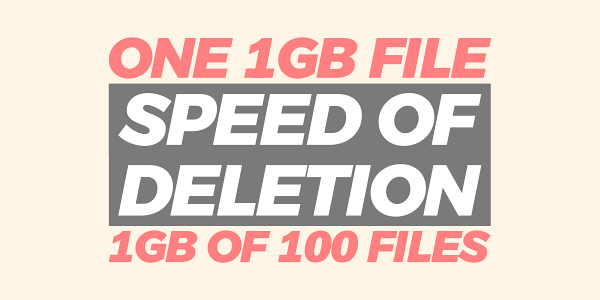Quick Overview
- Deleting a file doesn't erase it, just marks its space as reusable.
- Large files need fewer updates to the system's file index.
- Small files require many separate updates, which slows things down.
- It’s like making one big sale vs. hundreds of small ones—more steps means more time.
- That’s why deleting one large file is faster than deleting many small ones of the same total size.
Have you ever noticed how deleting a big file on your computer feels faster than deleting a bunch of smaller ones, even if they add up to the same size? It’s not just your imagination—there’s a good reason for this.
{tocify} $title={Table of Contents}
How File Deletion Works
When you delete a file, the data doesn’t just disappear. Instead, your computer marks the space it used as "free" so it can be reused later. The actual data sticks around until something else overwrites it.
To do this, your computer updates a kind of list, or index, that keeps track of which parts of the hard drive are used and which are free. This is where the difference between big and small files comes in.
Why Big Files Are Faster to Delete
1. Fewer Updates to the Index
If you delete one big file, the computer only has to update one entry in its index to mark all that space as free. For example, a 1GB file takes just one update.
Now, imagine you delete a lot of small files. The computer has to update the index for each of them, one at a time. Even if the total size is still 1GB, it takes longer because it’s doing a lot more work.
2. A Simple Analogy
Think of it like selling candy bars. You have 1,000 candy bars to sell. If one person buys all 1,000, you only need to write down their name once. But if 150 people each buy some, you end up with a much longer list. Now, if you need to tell everyone the candy is sold out, one call is quick, but calling 150 people takes ages!
This is similar to how deleting a big file means fewer updates, while deleting many small ones means a lot of updates.
Another way to look at it: When you delete a big file, the computer sends a single command to the hard drive: “Mark this file as gone.” But with lots of small files, it has to send that command for each one. More commands mean more time.
Wrapping Up
So, deleting one large file is faster because your computer only has to do one update in its index. Deleting lots of smaller files takes longer because each file needs its own update. That’s why it feels slower, even if the total size is the same.
Source: Reddit
Read also:

